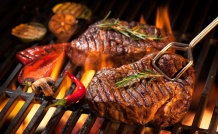Online Class: Kitchen Sanitation 101
This course will explain the best ways to prevent foodborne illness, including hand washing techniques, dishwashing practices, facility cleaning, best practices for storage, food handling, temperature monitoring, pest prevention, and managing relationships with the health department.

$70.00
no certificate
no certificate
- OR -
$95.00
with CEU Certificate*
with CEU Certificate*
Start Right Now!
$95.00 (with CEU Certificate)
Taking multiple courses? Save with our platinum program.
-
13Lessons
-
19Exams &
Assignments -
4Hours
average time -
0.4CEUs
Course Description
Nearly every few weeks, a new story seems to hit the headlines about foodborne illnesses. Salmonella in peanuts. E. coli in fruit juice. Mad cow in hamburgers. Every year, thousands of people become seriously ill from foodborne illnesses, and some even die. A single outbreak of salmonella in peanut butter in 2008-09 forced the largest food recall in U.S. history, sickened more than 600 people, killed 9, and caused parents everywhere to question the safety of a childhood staple, the peanut butter and jelly sandwich. Add to this the stories of sick cattle being processed for food in meat packing plants, and it is easy to see how fragile our food supply system can be.
This online course will explain why and how bacteria transfers from one place to another, multiplies, and makes people sick. We'll also explain the best ways to prevent foodborne illness, including hand washing techniques, dishwashing practices, facility cleaning, best practices for storage, food handling, temperature monitoring, pest prevention, and managing relationships with the health department. Also, if you ever plan on designing or managing your own restaurant, this training module offers some helpful suggestions about kitchen design and planning.
- Completely Online
- Self-Paced
- Printable Lessons
- Full HD Video

- 6 Months to Complete
- 24/7 Availability
- Start Anytime
- PC & Mac Compatible
- Android & iOS Friendly
- Accredited CEUs

Course Lessons
Lesson 1: Introduction
Although there will always be factors outside your control, by understanding the best practices in kitchen hygiene and sanitation, you can make sure your facility is as safe as possible.
12 Total Points
 Lesson 1 Video
Lesson 1 Video Lesson discussions: Kitchen Sanitation; Reasons for Taking this Course
Lesson discussions: Kitchen Sanitation; Reasons for Taking this Course Complete: Lesson 1 Assignment
Complete: Lesson 1 Assignment Assessment: Lesson 1 : Introduction
Assessment: Lesson 1 : Introduction
Lesson 2: Overview of Foodborne Illnesses
It happens all the time. You enjoy a pleasant meal in what seems like a nice restaurant. You start out feeling just fine, but over the course of a few minutes or a few hours, you find yourself feeling worse and worse.
15 Total Points
 Lesson 2 Video
Lesson 2 Video Lesson discussions: Foodborne Illness
Lesson discussions: Foodborne Illness Complete: Lesson 2 Assignment
Complete: Lesson 2 Assignment Assessment: Lesson 2 : Overview of Foodborne Illnesses
Assessment: Lesson 2 : Overview of Foodborne Illnesses
Lesson 3: Hand Washing
The Centers for Disease Control and Prevention (CDC) has stated that hand washing is the single most important way to prevent the spread of infection. It seems like common sense, right?
9 Total Points
 Lesson 3 Video
Lesson 3 Video Assessment: Lesson 3 : Hand washing
Assessment: Lesson 3 : Hand washing
Lesson 4: Food Handling
The basic rules of food handling are simple: Clean, separate, and cook. If you just focus on those three principles, your kitchen will be a safe and healthy one.
15 Total Points
 Lesson 4 Video
Lesson 4 Video Complete: Lesson 4 Assignment
Complete: Lesson 4 Assignment Assessment: Lesson 4 : Food Handling
Assessment: Lesson 4 : Food Handling
Lesson 5: Temperature Control
As discussed in Lesson 2, most harmful foodborne illnesses thrive at mid-range temperatures,and many can be killed at high temps. Be sure all foods are cooked to proper internal temperatures.
9 Total Points
 Lesson 5 Video
Lesson 5 Video Assessment: Lesson 5 : Temperature Control
Assessment: Lesson 5 : Temperature Control
Lesson 6: Storing and Serving
Most restaurants do not can or preserve their own food, but they do use a lot of canned items. So what happens when you find a dented can? Food is expensive, especially the super-sized cans of foods used in commercial kitchens.
10 Total Points
 Lesson 6 Video
Lesson 6 Video Assessment: Lesson 6 : Storing and serving
Assessment: Lesson 6 : Storing and serving
Lesson 7: Dishwashing
Washing dishes seems like pretty much of a no-brainer. You do it all the time at home -- rinse the dishes, wash the dishes, dry the dishes, put the dishes away.
10 Total Points
 Lesson 7 Video
Lesson 7 Video Assessment: Lesson 7 : Dishwashing
Assessment: Lesson 7 : Dishwashing
Lesson 8: Cleaning Practices (Facility Sanitation)
There are two major parts to keeping your facility clean: the kitchen and the dining room area. Both are extremely important to the health, sanitation, and reputation of your business.
10 Total Points
 Lesson 8 Video
Lesson 8 Video Assessment: Lesson 8 : Cleaning practices (Facility sanitation)
Assessment: Lesson 8 : Cleaning practices (Facility sanitation)
Lesson 9: Employee Health/Cleanliness/Hygiene
There are some basic principles of health and hygiene that anyone in a restaurant operation should adhere to. Not only can poor hygiene reflect badly on your business, it can also create an environment where germs spread easily.
Additional lesson topics: Employee Hygiene
12 Total Points
 Lesson 9 Video
Lesson 9 Video Complete: Lesson 9 Assignment
Complete: Lesson 9 Assignment Assessment: Lesson 9 : Employee health/cleanliness/hygiene
Assessment: Lesson 9 : Employee health/cleanliness/hygiene
Lesson 10: Handling It All: Dishes, Knife Skills, and the Food Supply
Handling knives in the kitchen requires special care, both for health and safety reasons. Knives should always be kept sharp.
10 Total Points
 Lesson 10 Video
Lesson 10 Video Complete: Lesson 10 Assignment
Complete: Lesson 10 Assignment Assessment: Lesson 10 : Handling it all: Dishes, Knife Skills and the Food Supply
Assessment: Lesson 10 : Handling it all: Dishes, Knife Skills and the Food Supply
Lesson 11: Hazard Analysis and Critical Control Point Planning
The food industry is continually working to improve safety and quality of products. One way facilities improve is through adopting a Hazard Analysis and Critical Control Points (HACCP) program.
Additional lesson topics: Checklist
10 Total Points
 Lesson 11 Video
Lesson 11 Video Lesson discussions: Checklist
Lesson discussions: Checklist Assessment: Lesson 11 : Hazard Analysis and Critical Control Point Planning
Assessment: Lesson 11 : Hazard Analysis and Critical Control Point Planning
Lesson 12: Behind the Scenes: Setup and Relationships With the Health Department
The health department is an essential part of every restaurant's operation, and it makes good business sense to create positive working relationships with inspectors and the office staff.
10 Total Points
 Lesson 12 Video
Lesson 12 Video Assessment: Lesson 12 : Behind the scenes: Setup and relationships with the Health Department
Assessment: Lesson 12 : Behind the scenes: Setup and relationships with the Health Department
Lesson 13: Conclusion
As a worker or a manager in a commercial kitchen, everything you do has an impact on the quality of the final product your customer receives.
75 Total Points
 Lesson 13 Video
Lesson 13 Video Lesson discussions: How would you rate this course?; Program Evaluation Follow-up Survey (End of Course); Course Comments
Lesson discussions: How would you rate this course?; Program Evaluation Follow-up Survey (End of Course); Course Comments Assessment: Lesson 13 : Conclusion
Assessment: Lesson 13 : Conclusion Assessment: The Final Exam
Assessment: The Final Exam
207
Total Course Points
Learning Outcomes
By successfully completing this course, students will be able to:
- Describe foodborne illnesses.
- Summarize the importance of hand washing.
- Describe proper food handling techniques.
- Summarize temperature control for varying food types.
- Describe proper techniques for storing and serving.
- Summarize proper techniques for dishwashing.
- Describe cleaning practices (facility sanitation).
- Summarize employee health/cleanliness/hygiene.
- Define hazard analysis and critical control point planning.
- Demonstrate mastery of lesson content at levels of 70% or higher.
Additional Course Information

- Document Your Lifelong Learning Achievements
- Earn an Official Certificate Documenting Course Hours and CEUs
- Verify Your Certificate with a Unique Serial Number Online
- View and Share Your Certificate Online or Download/Print as PDF
- Display Your Certificate on Your Resume and Promote Your Achievements Using Social Media

Course Title:
Kitchen Sanitation 101
Course Number:
7550208
Languages:
English - United States, Canada and other English speaking countries
Category:
Availability:
This course is online and available in all 50 states including: California, Florida, Georgia, Illinois, New York, Pennsylvania, Ohio, Texas, and Washington.
Last Updated:
June 2022
Course Type:
Self-Paced, Online Class
CEU Value:
0.4 IACET CEUs (Continuing Education Units)
CE Accreditation:
Universal Class, Inc. has been accredited as an Authorized Provider by the International Association for Continuing Education and Training (IACET).
Grading Policy:
Earn a final grade of 70% or higher to receive an online/downloadable CEU Certification documenting CEUs earned.
Assessment Method:
Lesson assignments and review exams
Course Fee:
$95.00 U.S. dollars
Choose Your Subscription Plan
Course Only
One Course
No Certificate / No CEUs
No Certificate / No CEUs
$70
for 6 months
Billed once
This course only
This course only
| Includes certificate | X |
| Includes CEUs | X |
| Self-paced |

|
| Instructor support |

|
| Time to complete | 6 months |
| No. of courses | 1 course |
Certificate Course
One Course
Certificate & CEUs
Certificate & CEUs
$95
for 6 months
Billed once
This course only
This course only
| Includes certificate |

|
| Includes CEUs |

|
| Self-paced |

|
| Instructor support |

|
| Time to complete | 6 months |
| No. of courses | 1 course |
Platinum Yearly
ALL COURSES
Certificates & CEUs
Certificates & CEUs
$189
per year
Billed once
Includes all 600+ courses
Includes all 600+ courses
| Includes certificate |

|
| Includes CEUs |

|
| Self-paced |

|
| Instructor support |

|
| Time to complete | 12 Months |
| No. of courses | 600+ |
Platinum 2 Years
ALL COURSES
Certificates & CEUs
Certificates & CEUs
$299
for 2 years
You save $79.00!
Billed once
Includes all 600+ courses
Includes all 600+ courses
| Includes certificate |

|
| Includes CEUs |

|
| Self-paced |

|
| Instructor support |

|
| Time to complete | 24 Months |
| No. of courses | 600+ |
Student Testimonials
- "Good job by the instructor. Will recommend class to others." -- Kelley C.
- "What was most helpful was the overall flow of the lessons and material. This course was very helpful and knowledgeable." -- Phil H.
- "The sections were laid out in good order and would be extremely helpful to anyone opening a restaurant from scratch or as a take over. I thought the assignments were helpful as it made me think in more depth about each lesson." -- Richard H.
- "The instructor answered my emails quickly and was very helpful and available. Dish washing and temperature control were two very good lessons in this course. The charts were helpful as well." -- Joshua F.
Related Courses
-
 30 hours
3.0 CEUs
Cooking Class Bundle: 5 Cooking Courses
$120.00
30 hours
3.0 CEUs
Cooking Class Bundle: 5 Cooking Courses
$120.00
-
 29 hours
2.9 CEUs
Human Resources Productivity Course Bundle
$120.00
29 hours
2.9 CEUs
Human Resources Productivity Course Bundle
$120.00
-
 3 hours
0.3 CEUs
Italian Cooking 101
$95.00
3 hours
0.3 CEUs
Italian Cooking 101
$95.00
-
 4 hours
0.4 CEUs
How to Bake Cookies
$95.00
4 hours
0.4 CEUs
How to Bake Cookies
$95.00
-
 9 hours
0.9 CEUs
Aromatherapy 101
$95.00
9 hours
0.9 CEUs
Aromatherapy 101
$95.00
-
 8 hours
0.8 CEUs
Aromatherapy (Intermediate to Advanced)
$95.00
8 hours
0.8 CEUs
Aromatherapy (Intermediate to Advanced)
$95.00
-
 7 hours
0.7 CEUs
Spanish Culture 101
$95.00
7 hours
0.7 CEUs
Spanish Culture 101
$95.00
-
 5 hours
0.5 CEUs
All About Herbs
$95.00
5 hours
0.5 CEUs
All About Herbs
$95.00
-
 5 hours
0.5 CEUs
Bread Baking 101
$95.00
5 hours
0.5 CEUs
Bread Baking 101
$95.00
-
 3 hours
0.3 CEUs
Spanish Cooking 101
$95.00
3 hours
0.3 CEUs
Spanish Cooking 101
$95.00
-
 5 hours
0.5 CEUs
Workers' Compensation 101
$95.00
5 hours
0.5 CEUs
Workers' Compensation 101
$95.00
-
 5 hours
0.5 CEUs
Workplace Safety
$95.00
5 hours
0.5 CEUs
Workplace Safety
$95.00
-
 14 hours
1.4 CEUs
Cake Decorating 101
$95.00
14 hours
1.4 CEUs
Cake Decorating 101
$95.00
-
 5 hours
0.5 CEUs
Starting Your Own Cleaning Business
$95.00
5 hours
0.5 CEUs
Starting Your Own Cleaning Business
$95.00
-
 7 hours
0.7 CEUs
Waiter and Waitress Training 101
$95.00
7 hours
0.7 CEUs
Waiter and Waitress Training 101
$95.00
-
 6 hours
0.6 CEUs
Pie Baking 101
$95.00
6 hours
0.6 CEUs
Pie Baking 101
$95.00
-
 8 hours
0.8 CEUs
Tex Mex Cooking 101
$95.00
8 hours
0.8 CEUs
Tex Mex Cooking 101
$95.00







